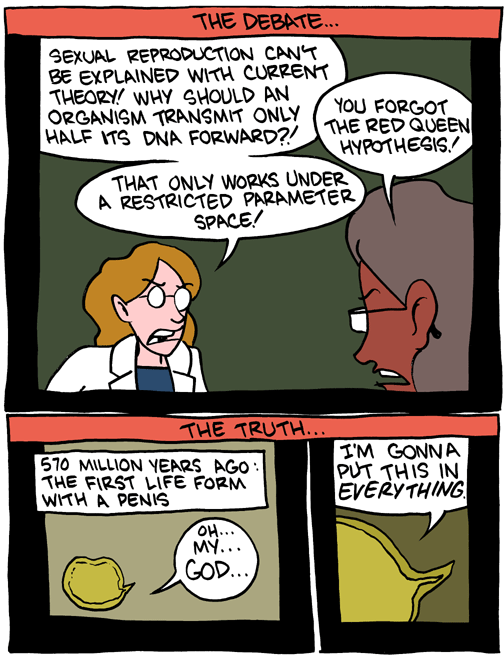This was my second year going to Evolution 2010, the join meeting of the Society for the Study of Evolution (SSE), the Society of Systematic Biologists (SSB), and the American Society of Naturalists (ASN). Last year I went as part of the Undergraduate Diversity program (which funded my way!) and had a blast.
This year was just as good. My talk was on the first day of the conference, which was awesome. I only had to spend that morning fretting, and I got to enjoy the rest of the conference stress-free (unlike most of my labmates). My presentation went alright – Prof said I did a good job, but I think I could have been a little smoother. I was surprised that I still had a good number of people in attendance, even though I was speaking at the same exact time as the end of the USA World Cup match. Yes, annoying vuvuzela sounds filled the conference hall.
As for the talks themselves, I went to a lot of interesting ones. Well, the first day started off a little shaky, but the conference improved once I started going to research talks. One of the bad things about the conference was that there were just so many talks – 12 concurrent sessions to choose from! You never know what talk is going to be good, so I know I missed some great ones just by choosing poorly.
The downside of going as a post-bach (I’m in undergrad/grad student limbo!) is that most of the stuff is still way over my head. Almost all of the talks are given by professors, post-docs, or nearly finished graduate students, so no matter how much of a nerdy brainiac I am, I was still way out of my league. So, sorry, no talk re-caps for you. Though Wired did cover one talk that I thought was super cool (and actually understood!), so check it out: Lizard Camouflage Confuses Males About Gender. Pssssssshhhh, Wired covered that but not my copulatory plug talk?
Some amusing things about the conference:
- I met Jerry Coyne! I was nervous to approach him since he was one of the most famous people there – not just for his blog (which I love) or his book (which my dad loved), but for kind of being the leading authority on speciation. He was super nice to talk to, so my nerves were unfounded. We talked for a good amount of time, mostly ranting about religious accommodationism and evolution. It surprised my lab, though. Or as my professor said, “Even I’d be nervous to talk to him.”
- There was a Christian Homeschooling Conference going on at the same time in the convention center. There was much loling by the evolutionary biologists. I think at least four different talks I saw made a joke about this is one way.
- Speaking of jokes, at least two presentations had penis jokes in them. We are so mature.
- So many nerdy t-shirts! One day I wore the same exact nerdy shirt as someone else, and we kept running into each other and giving each other shirt-props. Also, one day I was wearing my “You say Tomato, I say Lycopersicon esculentum” shirt and I actually ran into someone who studies tomatoes, who informed me that that was not the current accepted binomial nomenclature for tomatoes. Which I knew, but I just found it amusing that this was one of the few places where that could happen.
- All of the receptions had free “unlimited” (it said limit 2, but no one checked) beer and wine. However, you had to pay 3 dollars for water or pop. I think the conference understood it’s grad student audience very well.
Some amusing things about goofing off in Portland:
- I went to my first sushi-go-round. I had never heard of these things (mainly because I’m not a huge fan of sushi). Basically they put different small servings of sushi on a conveyor belt, and you snatch the ones you want to eat as they go by. It was pretty good, and that says a lot coming from me!
- Voodoo Donuts is fucking amazing. It’s a good thing I’m not living in Portland, or I would surely gain 300 pounds. Seriously, I’m going to have to make a trip from Seattle just to get another Old Dirty Bastard. Chocolate, peanut butter, and oreos on a donut? For less than two dollars? Hell yes. All the donuts I tried were delicious, not to mention that all had hilariously inappropriate name. We took our professor there the second night and tried to convince him to get the Cock and Balls. Thankfully he was amused and didn’t fire us all (yet). Also, I was severely tempted to get a The Magic is In The Hole shirt or panties, but I was too cheap.
- Right next to Voodoo Donuts was a creepy little hentai movie theater. I had to explain what hentai was to my labmates and professor.
Me: It’s anime porn.
Labmate: …Why would you watch that instead of the real thing?
Me: Because you’re not constrained by the bounds of reality.And then the discussion went to tentacles. I mean, how could you not when discussing hentai? I’m just said I didn’t think to trick my lab into actually going into the theater before they knew what it was.
- Omg Powell’s bookstore. It was so huge that I seriously got lost. They had a whole aisle devoted to evolution/genetics and a whole column to atheism. I was so overwhelmed I ended up not buying anything!
- I met a couple of my blog readers, which is always fun. Hi guys! Oh, and Jaki was awesome enough to give me a graphic adaptation of the Origin of Species, which is awesome and made my lab jealous.
I’m sure I’m forgetting some craziness, but that’s all I can remember right now. It was a lot of fun, and hopefully I can go back to Evolution and Portland in the future.






